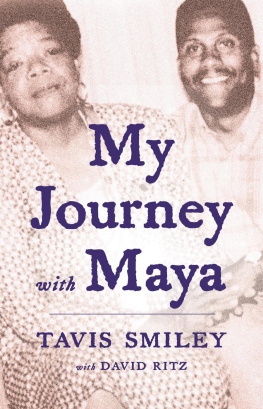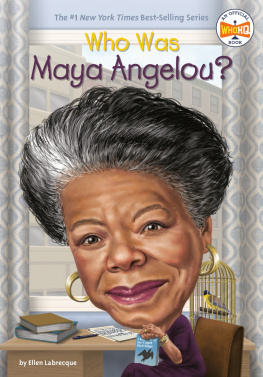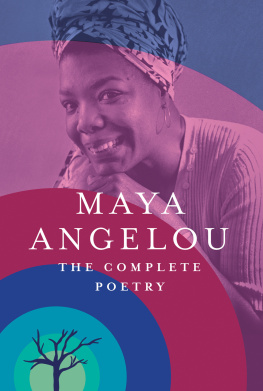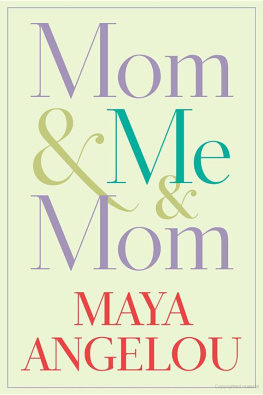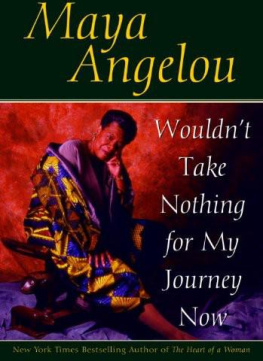Maya Angelou
Maya Angelou
The Iconic Self
MARY JANE LUPTON

Copyright 2016 by ABC-CLIO, LLC
All rights reserved. No part of this publication may be reproduced, stored in a retrieval system, or transmitted, in any form or by any means, electronic, mechanical, photocopying, recording, or otherwise, except for the inclusion of brief quotations in a review, without prior permission in writing from the publisher.
The author and the publisher gratefully acknowledge permission for use of material from Mary Jane Luptons interview (Talking with an Icon) with Maya Angelou on June 16, 1997.
Library of Congress Cataloging-in-Publication Data
Lupton, Mary Jane.
Maya Angelou : the iconic self / Mary Jane Lupton. Second edition.
pages cm
Includes bibliographical references and index.
ISBN 978-1-4408-3758-6 (hardback) ISBN 978-1-4408-3759-3 1.Angelou, MayaCriticism and interpretation.2.Women and literatureUnited StatesHistory20th century.3.African Americans in literature.I.Title.
PS3551.N464Z75782016
818.5409dc232015032345
ISBN: 978-1-4408-3758-6
EISBN: 978-1-4408-3759-3
201918171612345
This book is also available on the World Wide Web as an eBook.
Visit www.abc-clio.com for details.
Greenwood
An Imprint of ABC-CLIO, LLC
ABC-CLIO, LLC
130 Cremona Drive, P.O. Box 1911
Santa Barbara, California 93116-1911
This book is printed on acid-free paper 
Manufactured in the United States of America
Contents
Without the support of the late Dolly A. McPherson, professor of English at Wake Forest University, the first edition of this book, Maya Angelou: A Critical Companion, might not have been realized. I first met Professor McPherson at a conference of the Mid-Atlantic Writers Association held in Baltimore in 1990. Her book, Order Out of Chaos, published in that same year, was the first book-length study of Angelous autobiographical works. McPherson, a long-time personal friend of Angelous, had supported my work since that conference and had offered assistance on numerous occasions. Through her, Maya Angelou became aware of my interest in her autobiographies. Through her, I was finally successful in arranging an interview.
I am deeply grateful to Maya Angelou for her writings, her vitality, and her kindness. I thank her for being so gracious to me and my husband, Kenneth H. Baldwin, on the afternoon and night of June 16 and the morning of June 17, 1997. My husband, then chair of the English department at the University of Maryland, Baltimore County, though extremely busy, still had the time to offer substantial support: counting words and citations at several stages in the manuscript, shopping for groceries, dealing with computer repairs, checking the Internet, driving me to Winston-Salem. I am grateful for his love, reassurance, and tolerance, especially during the final three months of the initial project.
To my daughters and their familiesJulia on the West Coast and Ellen on the EastI am thankful for the phone calls, the questions, the encouragement. Of the friends who encouraged me in pursuing the field of Black Studies, I am indebted above all to my mentor, Harry L. Jones (19241997), professor emeritus of Morgan State University. I am also grateful to Aimee Wiest who, since we first met in the early 1970s, has always affectionately supported my writing. She was with me during my first exhilarating but brief meeting with Maya Angelou in 1995, following her lecture at Towson State University. Aimee, sensing my hesitation at the prearranged interview, literally pushed me into Angelous waiting limousine.
Many friends, colleagues, and graduate students at Morgan State University contributed to this project, among them John Clarke, Eugenia Collier, Shirley Meckler, Jennifer Kreshtool, Linda Meyers, Margaret Reid, Valerie Sedlak, Ella Stevens, Minnie Washington, and Elaine Tsubota. I am also grateful to my students in English 102, who for almost a decade had been writing their research papers on I Know Why the Caged Bird Sings, sharing their insights and anger and forcing me to be clear about my assumptions.
I wish to acknowledge the following women from North Carolina: Mildred Garris and Alma M. Golden of Dr. Angelous office at Wake Forest University; Rose Johnson, who welcomed Ken and me when we visited her aunt, Maya Angelou; Sharon E. Snow, curator at the Wake Forest Library; and Joyce Ford.
I am indebted to Dr. Earl Richardson, past president of Morgan State University, for having granted me a sabbatical for the fall semester of 1997 so that I could complete my study of Angelous autobiographies. I wish also to thank Kathleen Gregory Klein, the editor of the Greenwood Critical Companion Series. Maya Angelou: A Critical Companion, initially published in 1998, was part of that series, which has since been discontinued.
I retired from Morgan State University in 2001. Maya Angelou: The Iconic Self was written in the resort town of Cape May, New Jersey, a beautiful location but far from the support of an academic community. I have made numerous changes in this expanded revision, from a few overlooked errors in spelling, punctuation, and dates to major additions to the text in order to include Maya Angelous literary and cultural contributions since 1998. Maya Angelou: The Iconic Self retains the structure of the original: two introductory chapters followed by individual chapters on each of the autobiographies. Each of the individual discussions ends with an alternative reading. The new edition is more attentive to her poetry. There is an added chapter about the sixth autobiography as well as a greatly expanded bibliography. The Iconic Self also takes into account the enormous public response to her death.
Fortunately, I was able to rely on the skills, talents, and encouragement of my scholarly family as I wrote this second edition. My daughter Ellen Lupton is director of the MFA program in Graphic Design at the Maryland Institute of Art in Baltimore and Curator of Contemporary Design at the Cooper-Hewitt National Design Museum in New York. Ellen worked closely with me on June 11, 2015, as we viewed the Maya Angelou Archives at the Manuscripts, Archives and Rare Books Division of the Schomburg Center for Research in Black Culture. She has also offered invaluable technical assistance.
My daughter Julia Reinhard Lupton, associate dean of research, School of Humanities, the University of California, Irvine, worked diligently with me on downloading, file-saving, electronic editing, and other technical problems that I had not encountered while writing the first edition. She served as the liaison between me and my editor at Greenwood/CLIO, Kimberly Kennedy-White. Through their combined help I was able to acquire a Word document of the first edition from which I could make the necessary additions and revisions.
Throughout this writing my husband, Kenneth H. Baldwin, has listened to my interpretations, done extensive proofreading, searched the Internet, offered pertinent criticism, suggested revisions, and entertained me with his amazing wit. When he retired from his position as chair of the English department at the University of Maryland, Baltimore County, in 2006, I jokingly provided him with a scholarship to attend real estate school. He soon became qualified as an instructor and began teaching courses, primarily to brokers. Eventually he founded the Cape Atlantic School of Real Estate in Seaville, New Jersey, where his students affectionately call him Doc.

